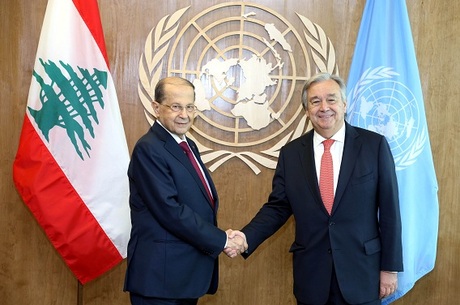
President Michel Aoun stressed Thursday in his maiden speech before the U.N. General Assembly that Lebanon will not allow the naturalization of any Syrian or Palestinian refugee on its soil “no matter what that might cost.”
“The decision in this regard belongs to us and not to anyone else,” Aoun underlined in a possible response to U.S. President Donald Trump’s suggestion that refugees be resettled closer to home
Noting that the Syrian state is now in control of “85 percent of its territory,” the president emphasized that “there is an urgent need to organize the return of refugees to their country.”
“Some call for the refugees’ voluntary return and we call for their safe return and differentiate between the two concepts,” Aoun noted.
“The claim that they will not be safe should they return to their country is an unacceptable excuse… If the Syrian state is carrying out reconciliations with the armed groups that it is fighting, wouldn’t it be able to do so with refugees who had fled the war?” the president asked.
He added: “The U.N. better help the refugees return home instead of helping them to stay in encampments that lack the least requirements of decent life.”
Separately and from the same U.N. podium, Aoun nominated Lebanon to become a “permanent, U.N.-affiliated center for dialogue among the various cultures, religions and races.”
“I hope the member states will back Lebanon in this demand, so that we can all work for peace, security and stability,” he added.
U.S. President Donald Trump’s suggestion that refugees be resettled closer to home instead of brought to the United States has angered many in Lebanon, a tiny country hosting more than 1.5 million refugees.
The country of just 4 million is officially hosting more than 1 million Syrian refugees and some 500,000 Palestinians. The real numbers are substantially higher as many don’t register with the U.N.
In an interview with Al Monitor `prior to his speech at the UN Aoun discussed the of the refugees issue
“The international community doesn’t help the Lebanese government. And we are paying more than the international community to help the refugees or displaced people in Lebanon because we have to provide them with water, electricity and everything else to make their life in Lebanon easier. The others, they are giving them food — but we are educating children, Syrian children. The schools are open twice a day, one session in the morning and one in the afternoon. And the hospitals are full.
All of these services are provided by the Lebanese government, and we are living under three crises. First, the global economic crisis certainly influenced our economy. Second, the war all around us has limited [our access to] Arab countries, because the only [land] access we have to the Arab countries is Syria. Otherwise, we have to go by plane, and this is not suitable for commerce. It is not the economic way, you know, to [conduct trade]. And the third crisis is the displaced people. And it is the most expensive.”

Leave a Reply
You must be logged in to post a comment.